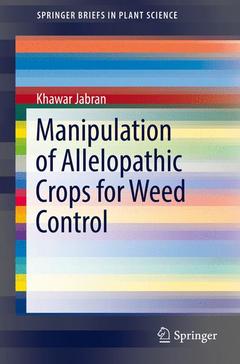Manipulation of Allelopathic Crops for Weed Control, 1st ed. 2017 SpringerBriefs in Plant Science Series
Auteur : Jabran Khawar

Provides recent developments regarding allelochemical synthesis in plants and their implications in the environment
Explains the ways where the science of allelopathy can be used to suppress weeds without extra costs
Discusses how allelopathic potential of crops can be exploited in forms such as use of allelopathic cultivars, allelopathic mulches, inclusion of allelopathic crops in crop rotation, and intercropping in order to control weeds
Includes supplementary material: sn.pub/extras
Date de parution : 03-2017
Ouvrage de 87 p.
15.5x23.5 cm
Thèmes de Manipulation of Allelopathic Crops for Weed Control :
Mots-clés :
Allelopathy; Allelochemicals; Weed control; Field crops; Crop rotation; Systems Biology



